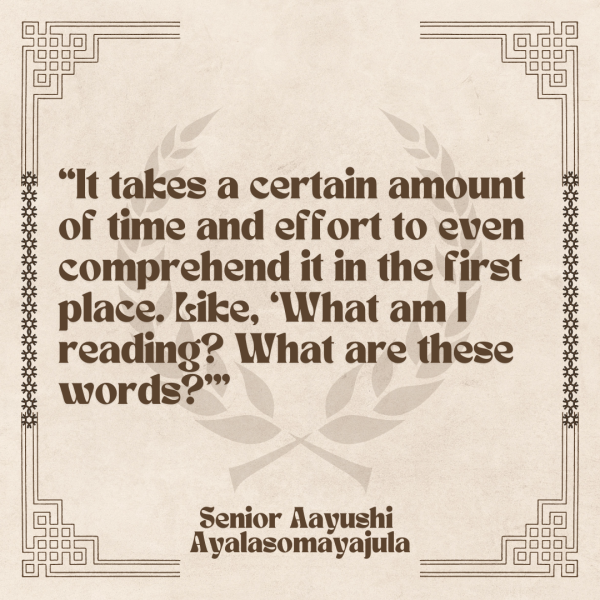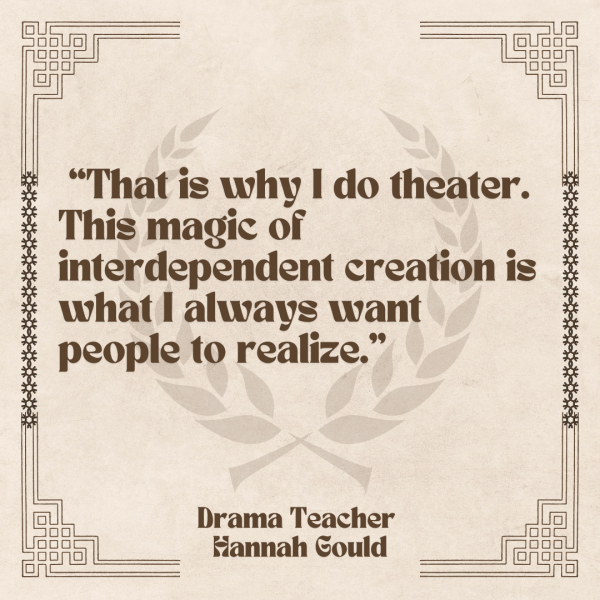
For the past month, Advanced Acting and Tech classes have been preparing for the upcoming adaptation of Shakespeare’s “Julius Caesar,” which is on Nov. 1. The production — MVHS Drama’s annual Fall Showcase — is set to begin at 7 p.m. in the Black Box theater. Drama teacher Hannah Gould selected a 16th-Century literary classic as this year’s Fall Showcase after MV Drama had an opportunity to watch the renowned theatrical group Oregon Shakespeare Festival (OSF) perform “Julius Caesar.”
“I just decided that ‘Julius Caesar’ has a lot of resonance with the current moment, the political stuff going on right now and media literacy issues,” Gould said. “A lot of different big personalities are popping up in our world right now that are influencing the way that people think and the way that people make decisions. There’s a lot of violence happening in our lives right now, so I thought it was a really relevant play.”
Taking inspiration from last year’s spring production of another Shakespearean play, “A Midsummer Night’s Dream,” Drama’s rendition of “Julius Caesar” is an adaptation, with elements of the play altered for comedic effect and simplicity. However, instead of having one cohesive show, Gould split her class into four groups, each adapting a different scene of the original in a different way. Though seemingly untraditional, this reflects the Fall Showcases of the past and allows all students to become involved with the adaptation process. While it is four separate acts, Gould plans to use the similarity in themes and messages to tie the production together, as they ultimately stem from the same story..
“I think it’ll be a good way for people to get a sense of what themes ‘Julius Caesar’ is about,” Gould said. “Even if they don’t really know that much about the plot when you see four different takes, you start noticing patterns and feeling resonance with certain ideas.”
Although this isn’t the first time Drama has adapted an Elizabethan-era play, there still have been struggles with handling the complexity of Shakespeare’s writing style. Senior Aayushi Ayalasomayajula still felt challenged at the very beginning, despite having experience from taking on prominent roles as writer, producer and director of Drama’s “A Midsummer Night’s Dream” last year.
“It was not the most straightforward because it takes a certain amount of time and effort to even comprehend it in the first place,” Ayalasomayajula said. “Like, ‘What am I reading? What are these words?’ I would say that we had workshops to help us through it. We had one English professor who helped explain the premise and we spent time discussing how this connects to us in our daily lives. I think that’s what we wanted to apply to the final piece.”

The challenges of adapting a classic play fall hand-in-hand with the difficulties of connecting various adaptations. One solution Gould devised was to reuse tech elements such as props and lighting patterns in each scene in hopes of “bringing the whole play together as one cohesive unit.” However, this causes issues when one skit needs a prop that doesn’t have relevance in another, and it challenges Advanced Tech students like Shaurya Sane as they create props for the play.
“[The four scenes] are very different, so it’s mainly just about how we can reuse these props for the different sections and still have them cohesive,” Sane said. “It’s just a little brainstorming at the start. But once you find something that can work for each part of the play, then you can go ahead and make it, and it’ll work out.”
According to Sane, Advanced Tech built the iconic Roman Doric columns in preparation for the set of “Julius Caesar.” Using large plastic tubes as a base, they add extra pieces of wood to create the fluting effect — the vertical grooves — that the columns are famous for. These columns are used for different purposes in each skit, such as being an ice cream tub in one and a podium in another. These abstract meanings the props hold correspond to the expressionist set design that Gould is striving for. She wants to use tech elements to make the audience think about ideas that aren’t directly represented — an interesting task for the actors.
“We’re working with minimal and interpretive sort of props and sets, so you really need to make sure that your message is getting across when you’re blocking so that the audience will be able to understand what you’re even doing,” Ayalasomayajula said. “You might be like stabbing someone, but you’re holding a mop. Especially because some of these scenes are so complicated with so much drama and plot elements, it was a struggle.”
But Gould is more than familiar with this struggle. In her five years of teaching drama, she’s noticed how students often feel intimidated by the daunting nature of starting with nothing and eventually performing an entire play. Gould is more than confident about the obstacles — happy even — because helping students push past that fear toward success is what drives her passion.
“I want all the students who are involved in working on it to feel proud of their work and feel like it came together,” Gould said. “There’s this special little miracle moment. That is why I do theater — going from that place of not knowing if it’s going to come together to like, ‘Wow, it happened, and it’s because everybody did their part.’ This magic of interdependent creation is what I always want people to realize.”

Similar to Gould’s goal, Ayalasomayajula transformed from a state of doubt to excitement after witnessing the script come to life. She saw the different adaptations of “Julius Caesar” that the different groups were able to output and was amazed at the ridiculously random yet unique concepts each ran with. As this is Ayalasomayajula’s last ever Fall Showcase, her hard work and contributions to this unique play are her way of saying a bittersweet goodbye.
“I’ve been really, really, really, really locked in because I want it to be good,” Ayalasomayajula said. “I’ve been more motivated to put my all into it because I know this is one of my last times performing in the Black Box or on the Monta Vista stage. I hope it goes smoothly, I hope no one breaks any props on stage, I hope no one loses anything and I hope we all remember our lines. Let it come together, please. It’s my hope, my dreams.”











